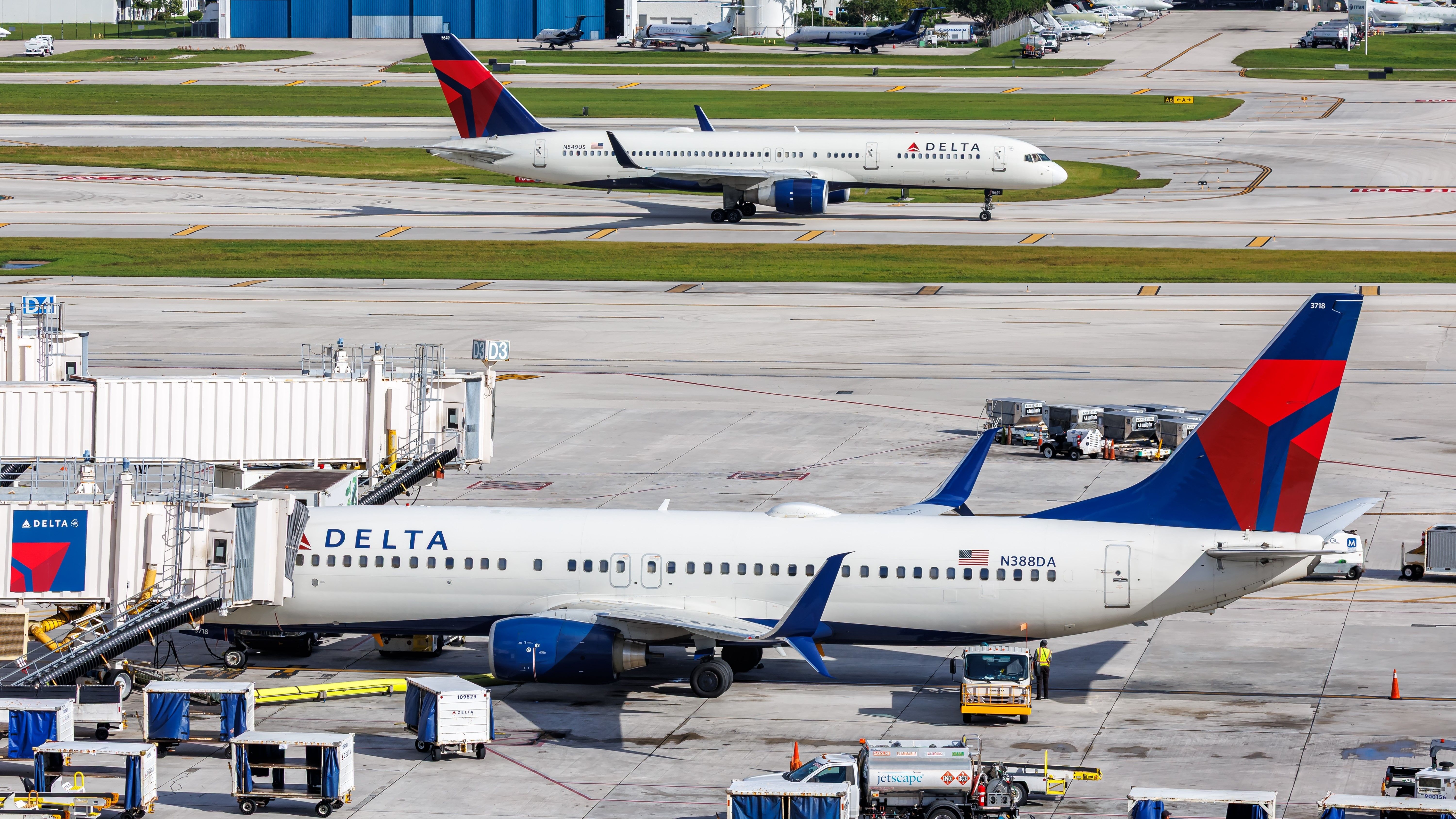Why Is Delta Air Lines Cutting 20% of New York Flights?

Delta Air Lines Reduces NYC Capacity: What You Need to Know
In a significant development for travelers, Delta Air Lines has announced a reduction of nearly 20% in its flight capacity at two of New York City's most prominent airports—John F. Kennedy International Airport (JFK) and LaGuardia Airport (LGA)—for the upcoming post-holiday season in 2025-2026. This strategic decision reflects a broader trend in the aviation industry as airlines reassess their operational strategies in response to changing demand dynamics. The implications of this reduction are vast, impacting flight availability, pricing, and traveler convenience.
Understanding the Capacity Reduction
The planned adjustments to Delta's flight schedule indicate a drop in operations by approximately 15-20% at JFK and LGA. Notably, this reduction will not eliminate any specific routes altogether; instead, it will involve a decrease in the frequency of flights assigned to each route. According to an analysis by The Points Guy, supported by data from Cirium, the months of November, December, March, and April are expected to see a slowdown of around 10% in operations.
The Federal Aviation Administration's Role
Delta's decision comes in light of the Federal Aviation Administration (FAA) extending its “Limited Waiver of the Slot Usage Requirement.” This waiver permits Delta to reduce flight frequency without risking the loss of its valuable takeoff and landing slots—an essential asset at busy airports like JFK and LGA. The FAA's regulations typically require airlines to maintain a minimum of 80% slot utilization, but this waiver allows Delta to strategically adjust its operations in response to current demand without losing access to these key airports.
Strategic Purpose Behind Capacity Changes
The primary motivation behind Delta's capacity cuts is to redeploy aircraft and staff to other hubs and routes projected to have higher demand. By making these adjustments, Delta aims to optimize its resources while still ensuring it retains access to some of the busiest airports in the country. A Delta spokesperson noted, "Following the FAA's extension of the NYC slot utilization waiver through Summer 2026, Delta is making select adjustments to our winter schedule at LaGuardia (LGA) and John F. Kennedy (JFK) airports. ... We apologize for any inconvenience that these schedule changes may cause. Delta remains committed to minimizing travel disruptions while ensuring a smooth transition for all impacted travelers."
The Post-Pandemic Landscape of Air Travel
The aviation industry has not fully returned to pre-pandemic levels, particularly at major hubs like JFK and LGA. Various factors contribute to this ongoing recovery, including air traffic control (ATC) issues that have created bottlenecks and affected the overall efficiency of air travel. As a result, many of Delta's flights are operating with a higher number of empty seats, indicating that the demand for travel has not yet rebounded to its former strength.
Seasonal Adjustments and Demand Fluctuations
The months earmarked for capacity cuts coincide with off-peak travel periods, suggesting that Delta intends to focus its resources during peak seasons, such as holiday travel times, where demand is typically higher. However, this operational strategy may also result in higher airfare prices. With fewer flights available, the reduced supply could lead to increased prices, particularly if demand exceeds expectations.
Innovations in Pricing: The Role of Artificial Intelligence
In addition to adjusting its capacity, Delta is also exploring the integration of artificial intelligence (AI) into its pricing models. The airline aims to leverage AI technology by the end of the year to optimize pricing strategies across its routes. Delta is currently testing generative AI on 3% of its routes, with plans to extend this testing to 20% by year-end. This move has drawn scrutiny from competitors and lawmakers alike, particularly concerning potential implications for consumer privacy and pricing fairness.
The Controversy Surrounding AI-Driven Pricing
The use of AI for pricing analysis raises significant concerns regarding data privacy and fairness in the airline industry. Democratic Senators Ruben Gallego, Mark Warner, and Richard Blumenthal have expressed their apprehensions in a letter to Delta's CEO, cautioning against what they term "surveillance pricing." This practice involves using aggregate personal data to determine optimal pricing based on individual customer profiles. Critics argue that such a model could lead to exploitative pricing strategies, wherein airlines might charge higher fares based on personal circumstances, such as an urgent need to travel due to a family emergency.
The Future of Air Travel: Balancing Capacity and Consumer Needs
As Delta Air Lines navigates this transitional phase in the aviation landscape, the challenge lies in balancing operational efficiency with consumer needs. While the capacity reduction may streamline operations and allow for better resource allocation, it also raises questions about accessibility and pricing for travelers. The airline's commitment to minimizing disruptions is commendable, yet the implications of reduced flight availability could affect travelers' experiences during off-peak seasons.
Key Takeaways for Travelers
For frequent flyers and occasional travelers alike, understanding the implications of Delta's capacity cuts and AI-driven pricing strategies is crucial. Here are some key takeaways to keep in mind:
- Flight Availability: Expect reduced frequency of flights during certain months, particularly in off-peak seasons.
- Potential Price Increases: Higher demand coupled with reduced supply may drive airfares up.
- Stay Informed: Regularly check Delta's flight schedules and updates regarding any changes to your travel plans.
- Monitor Pricing Trends: Be vigilant about fare changes, especially when booking flights during peak travel seasons.
FAQs About Delta's Capacity Reduction and AI Pricing
Will Delta completely cut any routes at JFK or LGA?
No, Delta's capacity reduction will not eliminate any specific routes. Instead, it will involve a decrease in the frequency of flights assigned to each route.
What are the expected months for reduced flight capacity?
Delta expects to reduce capacity during the months of November, December, March, and April.
How will the capacity cuts affect airfare prices?
The reduction in flight frequency may lead to higher airfare prices, especially if demand exceeds available seating.
What is surveillance pricing and why is it controversial?
Surveillance pricing refers to the practice of using personal data to determine optimal pricing for tickets, which raises concerns about privacy and fairness in pricing.
How can travelers stay informed about Delta's schedule changes?
Travelers should regularly check Delta's official website and sign up for alerts regarding flight schedules and any adjustments to their travel plans.
As Delta Air Lines navigates these operational transformations, the future of air travel remains uncertain yet intriguing. How will these changes impact your travel plans in the coming years? With the potential for increased prices and reduced flight options, travelers must stay vigilant and adaptable. As we witness the aviation industry evolve, the balance between operational efficiency and customer satisfaction will be key. What strategies do you think airlines should adopt to enhance the traveler experience in this changing landscape? #DeltaAirLines #AirTravel #AviationTrends
Published: 2025-08-13 04:39:06 | Category: Trump GNEWS Search



